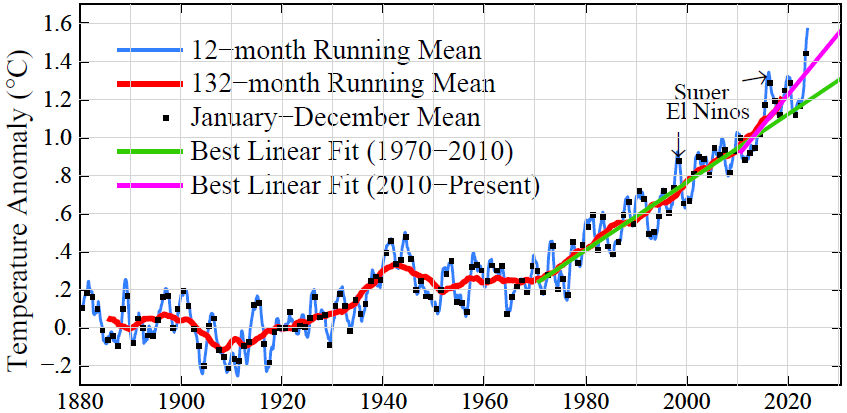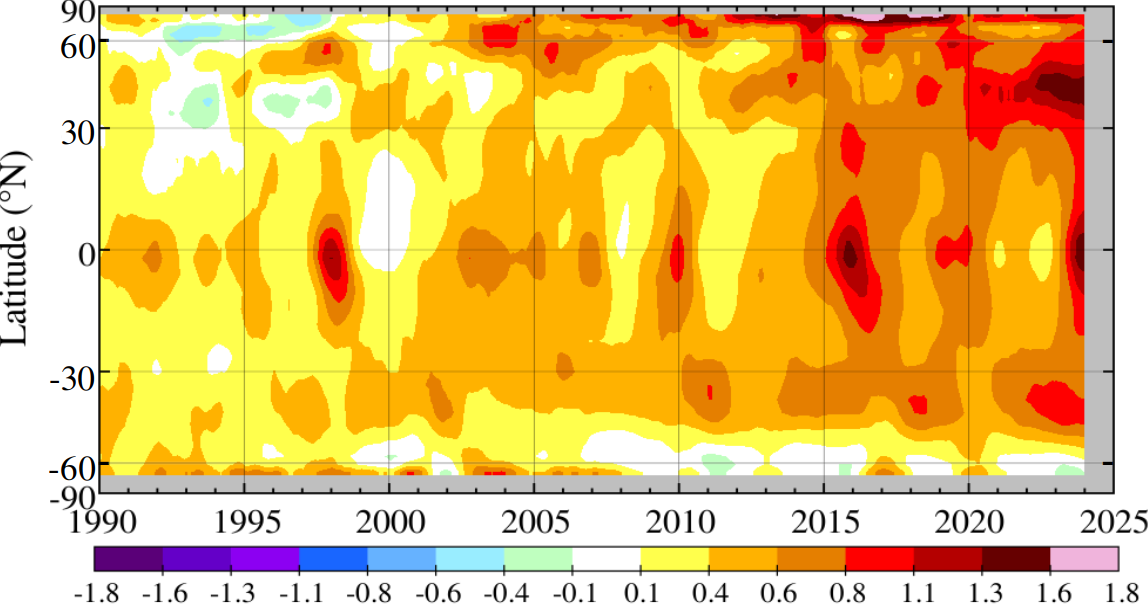Welcome to DU!
The truly grassroots left-of-center political community where regular people, not algorithms, drive the discussions and set the standards.
Join the community:
Create a free account
Support DU (and get rid of ads!):
Become a Star Member
Latest Breaking News
Editorials & Other Articles
General Discussion
The DU Lounge
All Forums
Issue Forums
Culture Forums
Alliance Forums
Region Forums
Support Forums
Help & Search
Environment & Energy
Related: About this forumJames Hansen et al: The World Will Cool Off - A Bit - and Other Good News!
https://www.columbia.edu/~jeh1/mailings/2024/GlobalCooling.2024.06.27.pdf
Fig. 1. Global temperature relative to 1880-1920 based on the GISS analysis. ¹ ²
Warming rate is 0.18°C/decade for 1970-2010, 0.32°C/decade for 2010-present.
The World Will Cool Off – A Bit – and Other Good News!
27 June 2024
James Hansen, Makiko Sato, Pushker Kharecha, Leon Simons
Abstract. We note news about successful actions to reduce human-caused climate change, based on initiatives of young people supported by Our Children’s Trust. But first we address misconceptions about the current unprecedented global warming rate.
“The Big Story” (titled Scorching heat wave may portend climate future) in The Hill last Thursday quoted Jonathan Overpeck, dean of the School for Environment and Sustainability at the University of Michigan, as saying, now that the El Nino has ended “we’re really looking at the next few months to tell us whether something dramatic is surprising us in the global temperatures. If it starts cooling off, [and] it hasn’t started to do that yet, we can ascribe [these] more unusual temperatures to the El Nino. If it keeps rocketing up, we’ll have to think about why climate change [is] accelerating.” [emphases are in The Hill article]
Although what Jonathan said is consistent with what some others are saying, we’re concerned about potential public misunderstanding. The world will soon start to cool off (see below), but that does not mean that we can ascribe the current unusual global heating to El Nino. Also, the rate of global warming really is accelerating (see below), even though global temperature will soon begin to decline. However, the global warming acceleration does not imply some dramatic surprise in our understanding of climate physics. The two large humanmade climate forcings – greenhouse gases (GHGs) and aerosols – account for accelerated global warming. The growth rate of these two forcings accelerated in the past 15 years.
The global warming rate since 2010 has accelerated to 0.32°C per decade, 78% faster than the 0.18°C per decade rate in 1970-2010 (Fig. 1). The impact of the acceleration on global temperature is large by 2030 (Fig. 1). Already the global anomaly of the 12-month mean temperature relative to preindustrial time is about +1.6°C (slightly less in the GISS analysis relative to 1880-1920 and slightly more than +1.6°C in other analyses relative to 1850-2000). The 12-month mean temperature is now approximately at its peak driven by the recent El Nino. The tropics, as expected, are transitioning into the La Nina state. By the end of 2024, global mean temperature will have declined significantly, but the annual 2024 global temperature should readily exceed the prior (2023) record.
The El Nino/La Nina cycle is the largest cause of interannual global temperature variability. The recent El Nino was only of moderate strength and Earth’s current energy imbalance is unusually large. Thus, the global temperature decline with the budding La Nina is likely to be only about 0.2°C to about 1.4°C, so for practical purposes the Nino-average global temperature has already reached +1.5°C relative to preindustrial global temperature.

Fig. 2. Zonal-mean SST (12-month running mean) relative to 1951-1980 base period.
…
2 replies
 = new reply since forum marked as read
Highlight:
NoneDon't highlight anything
5 newestHighlight 5 most recent replies
= new reply since forum marked as read
Highlight:
NoneDon't highlight anything
5 newestHighlight 5 most recent replies
James Hansen et al: The World Will Cool Off - A Bit - and Other Good News! (Original Post)
OKIsItJustMe
Jun 2024
OP
After 1998 (a super El Nino year) there was a lot of talk about global cooling
OKIsItJustMe
Jun 2024
#2
msongs
(70,231 posts)1. its the trend line, not the year to year variatiion nt
OKIsItJustMe
(21,016 posts)2. After 1998 (a super El Nino year) there was a lot of talk about global cooling
Legitimate scientists were writing papers explaining the “hiatus.”
I expect to see it repeat, but as you point out, the trend line told the whole story. 1998 was unprecedented, and 1999 was cooler than 1998, but warmer than 1996…